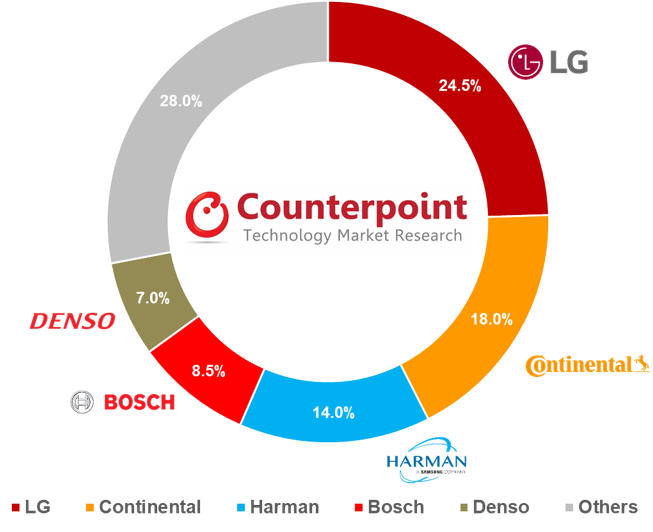• LG, Continental, Harman, led the global automotive Telematics Control Unit (TCU) market in 2018. 4G and 5G TCUs to account for most of the shipments by 2025. 2G/2.5G TCUs will cease to sell post-2021.
The global automotive TCU market is expected to grow at a rate of 14% CAGR during the 2019-2025 period, with cumulative shipments crossing 431 million units, according to the latest research from Counterpoint’s Smart Automotive service. The data represents the global TCU shipments for all vehicles including passenger cars, light commercial vehicles (LCVs), heavy commercial vehicles (HCVs), and buses.
In 2018, the eCall mandate in Europe continued to drive global TCU shipments. However, the growing adoption of embedded connectivity by Japanese and German automakers, coupled with rising demand for connected vehicles in China and the US, will drive the market during the forecast period.
Commenting on the findings, Aman Madhok, Senior Analyst at Counterpoint Research said, In terms of market share, LG leads the market, catering to close to a quarter of the total market demand, followed by Continental. GM is the major customer for LG, as most of its sales in key markets like the US and China are connected cars. However, LG should continue to diversify its customer base to maintain its market leadership position during the forecast period.

Discussing the various brands’ performance, Hanish Bhatia, Senior Analyst, highlighted, “Continental shipments continued to grow in 2018, with rising penetration of cellular connectivity within German automakers. Also, Denso has been working with Toyota for the Lexus brand till now, and the association will likely continue as Toyota adds embedded connectivity to its top-selling vehicles in the future”.
Looking at the connectivity technology, Satyajit Sinha, Research Analyst, said, Global shipments of 2G/2.5G based TCUs continued to decline in 2018 and would cease to sell post-2021. Backward compatibility or ‘fallback’ technology in TCUs is encouraging automakers to embed the latest connectivity module in TCUs. Moreover, leading telecom operators like AT&T and Vodafone have plans to shut their 2G/3G networks during the forecast period, in many countries to free spectrum for 4G and 5G.
Resonating similar thoughts, Vinay Piparsania, Consulting Research Director added, Today, it takes three to four years for car design to be approved and move to the factory. And once sold, the car can be on-road for another ten years. Hence, automakers must plan for 15 years while designing connectivity in their cars, making sure they can differentiate their cars and customers get fast connectivity during the car’s entire life.
Commenting on the connected car evolution, Neil Shah, Research Director said, Autonomous vehicles and connected cars are two important trends shaping the automotive industry. Even though autonomous vehicles are getting all the hype, it is connected cars which are gaining traction. OEMs are enhancing existing connected services including infotainment and predictive maintenance while adding newer services like insurance. Automakers and service providers are pushing connected services to gain from additional revenue stream, especially amid slowing automotive sales. The TCU’s transformation into a ‘gateway modem’ on steroids or the central brain is inevitable, which will power the car’s connectivity. TCU and related component vendors are set to play an important role in the automotive supply chain.

























